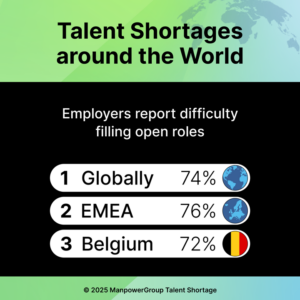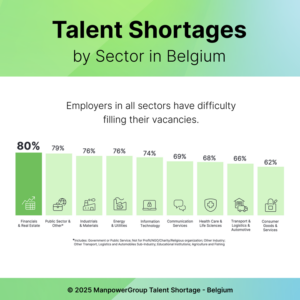Talent Shortages: 72% of Belgian Employers Struggle to Fill Vacant Positions
ManpowerGroup BeLux has been awarded an ‘EcoVadis Platinum’ Medal for its sustainability performance
15 January 2025
Belgian employers both resilient and cautious in their hiring forecasts for Q2 2025
11 March 2025Economic uncertainty, the influx of candidates into the labor market due to various bankruptcies and reorganizations, and artificial intelligence, have not changed the situation: Belgian employers continue to face recruitment challenges.
As the labor market remains under pressure due to economic uncertainty, talent shortages remain high in Belgium. According to a survey conducted by ManpowerGroup, 72% of the 525 employers surveyed report difficulties filling their vacant positions, with nearly one in five (17%) facing major challenges. However, this figure is two points lower than last year. The skills gap affects all three regions, with a more significant impact in Brussels (76%), followed by Flanders (72%) and Wallonia (70%).
“The results of our annual workforce shortages survey show that the imbalance between the supply and demand for skills continues to persist in the labor market, both in Belgium (72%) and worldwide (74%),” says Sébastien Delfosse, Managing Director of ManpowerGroup BeLux. “Employers are still having great difficulty filling their vacant positions, despite the exceptional influx of workers due to bankruptcies and reorganizations, which have reached a 10-year high in Belgium. Moreover, the significant advances made through automation and artificial intelligence have not yet reduced recruitment pressures. In 2025, employers will still need to make it a top priority to develop strategies to attract and retain employees.”
According to the latest figures from Satbel report(1), Belgium recorded a 10-year record number of bankruptcies in 2024 (more than 11,000), resulting in the loss of 32,566 jobs, while the Belgian Federal Government statistics(2) show that 103 companies initiated a collective layoff procedure, leading to the elimination of 12,354 jobs.
No relief from labor shortages despite advancements in AI
In its latest report on global workforce trends, “Accelerating Adaptability”(3), presented at the World Economic Forum (WEF) in Davos, ManpowerGroup observes that automation and AI-based technologies will not provide the immediate relief many expect, as these systems still require substantial human oversight to function effectively. The report also highlights several challenges related to AI implementation. After the initial enthusiasm, companies must bridge the gap between executives’ expectations and worker adoption, notably due to skill gaps and a lack of appropriate training, which are essential to achieving the anticipated productivity gains.
Talent shortages across all sectors
Employers across all sectors surveyed in Belgium are facing difficulties filling their vacant positions, particularly in the Financial and Real Estate Activities sector (80%), Public Services/Education/Other sectors (79%), Manufacturing Industry (76%), Energy (76%), and IT (74%). By company size, recruitment challenges are most significant in small businesses with 10 to 49 employees (80%). According to ManpowerGroup’s study, the most difficult profiles to find in Belgium are in Engineering 1 Technics (27%), IT & Data (25%), HR (19%), Production (17%), and Operations & Logistics (17%).
Overcoming talent shortages
To address talent shortages, employers must work harder than ever to attract and retain talent, as well as ensure that their workforce has the right skills to face the many challenges of digital transformation. It is no surprise that training (upskilling and reskilling) is the top solution chosen by Belgian employers (29%) to address these shortages. According to the World Economic Forum(4), workers can expect that two-fifths (39%) of their current skills will evolve or become obsolete between 2025 and 2030. At the same time, 60% of employers believe that digital technologies will transform their business by 2030.
Workers’ expectations for flexibility are fully integrated into employers’ strategies to address talent shortages, ranking second and fifth in priorities. Flexibility regarding work locations (hybrid and remote work) is in second place, with 19% of employers, while flexible working hours are cited by 17% of them.
Finally, to resolve the shortage of skilled labor, employers are opting to target new talent pools or rely more heavily on flexible staff (temporary or contracting).
(1) Number of bankrupties – Statbel : In 2024, 11,067 companies were declared bankrupt in Belgium. This represents an 8.0% increase compared to 2023 (10,243 bankruptcies) and the highest figure observed since 2013 (11,740). Regarding job losses, the 2024 figure (32,566) marks an 18.3% increase compared to 2023 (27,517) and is the third highest result over the past twelve years, behind 2013 (36,384) and 2014 (34,065).
(2) Number of collective layoffs – SPF emploi :. In 2024, 12,354 employees from 103 companies were affected by a collective layoff announcement. This is the highest figure since 2012, when 16,707 people lost their jobs through the Renault procedure.
(3) “Accelerating Adaptability“: Global ManpowerGroup Workforce Trends Report outlines 16 key trends across four major forces shaping the future of work: the expansive workforce, new ways of working, digital transformation, and accelerating global change.
(4) The World of Work Report 2025 (World Economic Forum)
ManpowerGroup’s Talent Shortage Survey was conducted in October 2024 as part of the ManpowerGroup Employment Outlook Survey. It involved a representative sample of 40,000 public and private employers (including 525 in Belgium) across 42 countries and territories.










